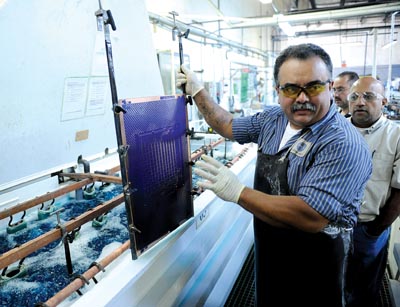
The office of Royal Circuit Solutions CEO Milan Shah is
decorated with an array of Star Trek figurines, but he’s not just a
fan of the iconic 1960s show. In his business
– building printed circuit boards applicable to just about every
use in the electronics industry – classic dolls of the two main
characters propped on shelves in the room personify a certain,
prophetic air. As Shah pointed out Friday, Capt. Kirk is holding
what appears to be a cell phone, and Sp
ock is grasping a contraption that looks eerily familiar to
modern tablets.
The office of Royal Circuit Solutions CEO Milan Shah is decorated with an array of Star Trek figurines, but he’s not just a fan of the iconic 1960s show. In his business – building printed circuit boards applicable to just about every use in the electronics industry – classic dolls of the two main characters propped on shelves in the room personify a certain, prophetic air. As Shah pointed out Friday, Capt. Kirk is holding what appears to be a cell phone, and Spock is grasping a contraption that looks eerily familiar to modern tablets.
“This guy had a vision in the ’60s,” Shah said, while holding the Spock figurine.
Shah had quite a vision himself when, then based in San Jose, he came to Hollister three years ago. Formerly part-owner of a printed circuit board company in Chicago, he bought the struggling Hollister business while it appeared within months of folding.
Since then, he has invested millions of dollars into the business, quadrupled revenue from $1.5 million annually to $6 million, more than doubled the workforce from 16 to 35 and spawned a buzz among employees who have seen their pay and benefits improve dramatically. He did it during one of the nation’s worst economic recessions on record, in a manufacturing sector decimated by overseas competition from Asia and elsewhere.
The once-perishing company now turns a profit. It is looking to expand its 15,000-square-foot building, and last month the company bought the headquarters facility at 21 Hamilton Court.
“The stars basically lined up,” he said.
Royal Circuit Solutions serves lower-volume customers who need fast results, what Shah described as a “prototype quick-turn shop.” It was founded in 1994 and had a few good years before the dot-com bubble burst. Afterward, it had been on the same path as most other U.S. circuit board manufacturers – a number that plunged from around 1,800 in the early 1990s to fewer than 300 today – before Shah stepped in three years ago and brought a fresh outlook to the table. That included three primary changes.
First off, he wanted to expand significantly, servicing customers worldwide, by broadening the technological sophistication and marketing more aggressively. The technology has virtually doubled, with the capacity for 20-layer circuit boards, where it was limited to 10 just a few years back. He has widened the reach as well. Most of the company’s business had been in the Bay Area before Shah. Now, it has customers in almost every state along with other countries such as Brazil, Canada, Mexico and some in Europe.
Second, he said Royal Circuit Solutions needed better equipment and invested significant capital in the upgrades – which Shah estimated at about $1.5 million to date, with a lot of materials purchased for “pennies on the dollar” from other area recession-bitten companies, such as Lifesparc, closing their doors.
And although the general “talent pool” had been in place three years ago – most of the engineers, salesmen, technicians and other employees came over years before from other now-defunct regional companies such as Hadco Corp. in Watsonville – Shah said he stressed a need to significantly improve workers’ pay and health benefits. He noted that the company now pays for 90 percent of workers’ health care, and plans to bump it to 100 percent next year.
“Everybody got a second life,” he said. “Everybody got a second wind.”
Shah largely credited the “team effort” from workers as the key to success. He also lauded support he has received from the City of Hollister, which is important considering Shah initially had big concerns about water. He said City Manager Clint Quilter quelled those and other worries and has been helpful from day one.
Most important, Shah said the workers brought a new energy to their work.
“My first day I threatened everybody in this company,” he said. “I said we will force you to buy a new house. We will force you go get a new car. We’re going to force you to improve your lifestyles.”
Employees there, meanwhile, have an obvious appreciation for the company’s upward direction.
“It’s just so much excitement to see where we’re going and how fast we’re getting there,” said Johnny DeArmas, the company’s inside sales manager who has been in the industry for more than two decades, and is among the former Hadco employees who came over after the dot-com crash.
On Friday morning, the 24-hour operation was busy as usual, partly because there are 65 different processes in making the boards.
See the full story in the Free Lance on Tuesday.









